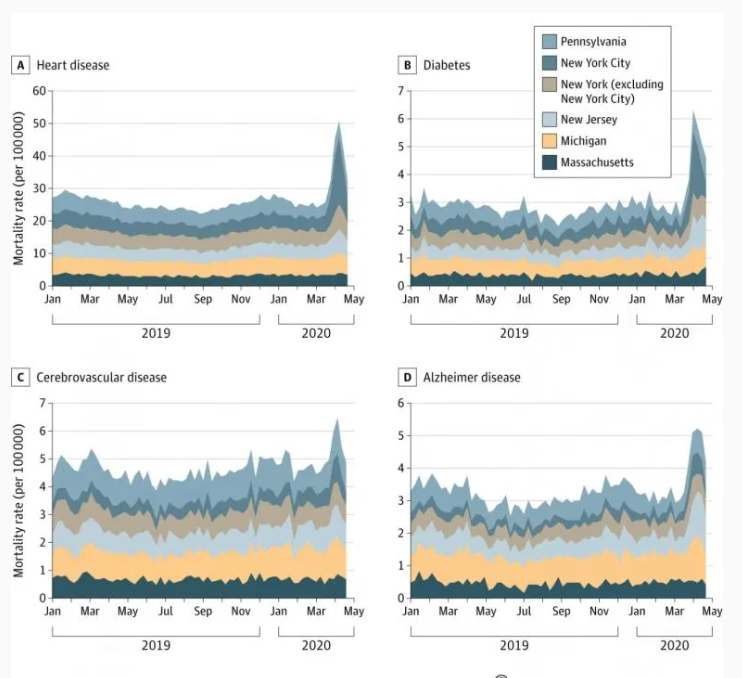by James A. Bacon
In March and April this year, the COVID-19 epidemic resulted in approximately 87,000 more deaths in the United States than the average for those months, concludes a new study published in the Journal of the American Medical Association. About 65% were directly attributable to the virus. The other 35% was due to spillover effects from the epidemic.
Some “excess” deaths may reflect under-reporting of COVID-19 cases, and some might involve patients who died from related complications, such as heart disease, that were listed as the cause of death rather than COVID-19, says lead author Steven Woolf, director emeritus of Virginia Commonwealth University’s Center on Society and Health, based on a study by VCU and Yale University researchers.
“A third possibility, the one we’re quite concerned about, is indirect mortality — deaths caused by the response to the pandemic,” Woolf said. “People who never had the virus may have died from other causes because of the spillover effects of the pandemic, such as delayed medical care, economic hardship or emotional distress.”
VCU News summarizes key findings:
Woolf said he and his team suspect that some of these were indirect deaths from the pandemic that occurred among people with acute emergencies, such as a heart attack or stroke, who may have been afraid to go to a hospital for fear of getting the virus. Those who did seek emergency care, particularly in the areas hardest hit by the virus, may not have been able to get the treatment they needed, such as ventilator support, if the hospital was overwhelmed by the surge. …
“We can’t forget about mental health,” Woolf said. “A number of people struggling with depression, addiction and very difficult economic conditions caused by lockdowns may have become increasingly desperate, and some may have died by suicide. People addicted to opioids and other drugs may have overdosed. All told, what we’re seeing is a death count well beyond what we would normally expect for this time of year, and it’s only partially explained by COVID-19.”
Added Dr. David Lanning, interim chief medical officer at VCU Medical Center:
There’s no question that many people avoided hospital care, preventive care, out-patient care, any contact with any healthcare facility, and sometimes even their healthcare provider because of fear of COVID. And that had disastrous consequences in that people didn’t get the acute care they needed, and didn’t get a lot of preventive care.
These charts show the spike in excess deaths attributed to major killers like heart disease, diabetes, cerebrovascular disease, and Alzheimer’s disease.
You can read a summary of the study and its methodology here.
Bacon’s bottom line: Neither Woolf nor Lanning discussed the politically sensitive issue of why so many people were so terrified of the COVID-19 that they failed to seek treatment for their ailments. One might mention the mandated shutdown of all “elective” procedures ordered by many governors, including Ralph Northam here in Virginia. One might also observe that nonstop media coverage bordering on the hysterical also fueled fears of a deadly, out-of-control disease.
Whatever the reasons for the failure of thousands of patients to seek treatment for non-COVID illnesses, this study represents the first serious effort to document the number of “excess” deaths. The study drives home a point made many times by multiple authors on this blog: The cost of the emergency shutdown cannot be measured by lost jobs and lost economic activity alone — it must be measured by deaths not counted in the daily COVID-19 death county. For every two people who died from the virus, by the VCU study’s reckoning, one has died from spillover effects of the epidemic.
The media’s monomaniacal focus on the number of confirmed COVID-19 cases and even COVID-19 deaths has contributed to the death of tens of thousands. Don’t expect the mainstream media to acknowledge its complicity in this catastrophe, though. Being a member of the hit-and-run media means never having to say you’re sorry.



